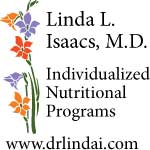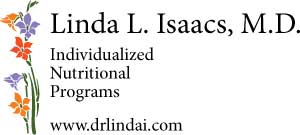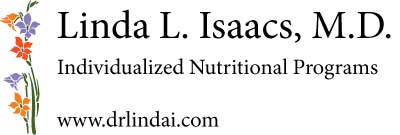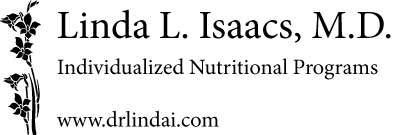Emotional and Spiritual Aspects of Healing
By Linda L. Isaacs, M.D.
Spiritual and emotional factors are very important parts of the healing process. To provide some direction in this area, I reviewed the patient roster for those with truly remarkable stories and looked for personal qualities that were common among them. The list of helpful qualities is not meant to cause you to focus only on those characteristics you already see in yourself, or to become depressed by those you lack. Rather, the goal is to provide food for thought.
Diligence
Your nutritional program is a big commitment: you must decide to totally change your lifestyle, to take capsules all day, to eat only certain foods, to follow the various procedures to cleanse your body. But if you don't actually put your program into practice, you'll never know for sure whether or not it works. Doing it halfway doesn't work, and just talking about it won't work. You have to do it, and keep doing it.
This is an incredible opportunity to make a new start—to follow a clean diet that's designed for you, to take good quality supplements and to cleanse your system. But it's up to you to take advantage of it. You have to be the one to decide to ask the questions you need to, to reread the directions to be sure you're doing things right. You have to make the many small decisions each day that add up to adherence. Or you can compromise—but then you'll never find out if this would have worked for you. If you look at this program as a tool you have chosen to use to heal, rather than as an imposition, you will find that sticking to it is much easier.
Perseverance
Some days it's easy to get motivated; others, it's not. That's when perseverance comes into action. All of us are emotional beings, and on a day when you don't feel happy, it's tempting to throw the plans that you made out the window and go eat a piece of chocolate cake.
When a really big obstacle comes up, that temptation to let your emotions dictate your actions gets even stronger. Having perseverance means resisting the emotions that tell you to quit. It means sticking by the decisions that you came to on a day when you might have been thinking more clearly. It means looking for solutions to problems. It can become easier with time, because each victory builds trust and faith, and can be remembered the next time perseverance is needed.
About the only thing any of us has control over is our own reaction to situations and problems. Whether we respond cheerfully, angrily or with sadness, whether we look for solutions or lapse into helplessness, whether we cling to our own point of view or look for another way—these are the choices we make.
You will have to figure out what to do to keep yourself motivated, and then do it when you feel discouraged. For many patients, understanding how the program works is a key motivator. I encourage you to review the materials available to understand why you are doing what you are doing. Don't ask others to badger you into compliance; choose what you want to do and do it.
Joy
You may feel that you have a lot of things to worry about. You may be right! But getting joy and fun out of life is enormously helpful to your recovery from illness. How can you stay motivated to make a lot of decisions all day to get healthy, if you see life as nothing but a burden?
If you have problems, don’t act like nothing is wrong. But don't act like nothing is right—find something positive! Go look at something beautiful. Listen to music you enjoy. Remember something nice someone did for you. Do something for someone else! List five things you are grateful for. Deal with the problems you can deal with; try not to dwell on those you can't. Enjoy and be grateful for the simple pleasures of life.
Trust
Lack of trust produces fear, which affects the autonomic nervous system very powerfully and negatively. Fear and suspicion can make you sick. Some people seem to trust easily; some don't. Past experiences and upbringing can make it easier or harder to trust. But for almost everyone, it requires a choice at times.
When you don't trust your doctor, it interferes with your treatment plan, since the success of that plan depends on your willingness to put the advice you are given into practice. In my experience, mistrusting patients spend more time and energy seeking reassurance from the doctor and other sources than in actually doing their program. Since compliance inevitably suffers, they usually do not get the results they hoped for.
In any situation, if you find yourself continually fighting a lack of trust, you may wish to examine your past to see if ways that you learned to relate to the world then are holding you back now. It may also help to examine what your expectations are. It may not be clear to others what you want, you may be dealing with someone who will not give you what you want, or your expectations may be unrealistic. Being clear about what you are looking for will help you find it.
Love
We all want to be loved and appreciated, to feel that we matter to others. Some may feel they have love in their life, some may not, but everyone has the need for love.
When you are sick, the way you express and receive love will probably change. Your illness does not only affect you; everyone around you reacts to it. Sometimes friends don't know what to say and retreat from you, or they may say something thoughtless and hurt you. Others may try to tell you what to do. Sometimes people are caught up by fear of losing you and so they don't want to let you talk about your illness. You may not be able to play your usual role in the family, causing uncertainty for yourself and others. There are as many different types of reactions as there are patients and families. But some reaction is almost inevitable.
For some patients, illness is the catalyst for a whole new way of looking at life, and at relationships. Many say they never knew how many people loved them until they got sick.
Admitting our need for love can be frightening, especially if you don't see much in your life. But admitting the need for love is the first step to finding it. There are a host of books out there that can help. But practically, the best way to be loved is to love; to simply enjoy people, to value them, to listen to their perspectives and let them know you care. As you learn to love, you will find love.
Truth
Most of the patients who come into this office have had to deal with difficult situations in life. Health problems, whether life-threatening or not, can be very taxing emotionally, financially, and spiritually, for the patients and their loved ones. Patients who can face the truth about their situation handle illness more successfully. They are better equipped to make the changes needed; they are easier to advise, because they give accurate information about their condition and their compliance with the treatment.
Patients can have many reasons to deceive themselves and others. For example, fear can play a role—pretending a frightening health problem doesn't exist. A desire to avoid making decisions or having confrontations can be a factor. Some patients exaggerate their compliance with their program out of a misguided desire to look good—to present the image of the “model” patient. Some patients want to avoid sadness so they pretend nothing is wrong.
For us to know how to help, you must be honest about how you are doing and what you are doing. I cannot give you good directions unless I know where you are! Over the years, Dr. Nicholas Gonzalez and I have had patients lie about many things for many reasons. Across the board, these patients have not done well. Success on the program requires honesty, both with us and with yourself.
Choosing to be honest can be frightening at times, but it is absolutely necessary. Growth in the other areas previously discussed requires honesty, because the honest patient sees what needs to change.
Resilience
Resilience is the ability to recover from or adjust to misfortune or change, which come to all of us sooner or later. Resilient people honestly face the realities of their situation. They resist the temptation to see themselves as helpless victims, and do their best to improvise solutions to their problems with the resources they have available. Resilient patients do what is needed to acknowledge and mourn their losses, while moving through and forward with their lives.
Conclusion
While I primarily use nutritional methods to improve health, I certainly believe that emotional and spiritual factors are extremely important. I hope that this material has been helpful to you in addressing these areas.




